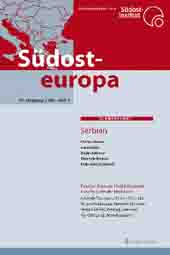Montenegro’s Kosovo Crisis
Montenegro’s Kosovo Crisis
Author(s): Kenneth MorrisonSubject(s): Politics / Political Sciences
Published by: De Gruyter Oldenbourg
Summary/Abstract: Abstract. Montenegro’s recognition of Kosovo in October 2008 precipitated a political crisis. Prior to recognition, both internal and external factors had contributed to an increasing tension that pressed for a decision on the issue. With the Serb community in Montenegro still coming to terms with the country’s break from Serbia in 2006, it heavily opposed a recognition of Kosovo. The Albanian community, on the other hand, well integrated and loyal to the Montenegrin state, perceived an unnecessary delay in the act of recognition. The U.S., the U.K. and the EU exercised considerable pressure on the Montenegrin government. Yet regional relations, above all with Serbia, had been stable for some time. Montenegro chose to recognize Kosovo in the immediate aftermath of its support for Serbia’s appeal to the UN General Assembly, arguing with the need to acknowledge political realities. The decision was followed by violent riots. Yet, as the article demonstrates, the recognition not only helped the Montenegrin government gain the favour of international powers, but also served to set off political dynamics within the country, which may prove advantageous to the present government of Milo Djukanović in the upcoming elections of September 2009.
Journal: Südosteuropa. Zeitschrift für Politik und Gesellschaft
- Issue Year: 2008
- Issue No: 03
- Page Range: 418-423
- Page Count: 6
- Language: English
- Content File-PDF

